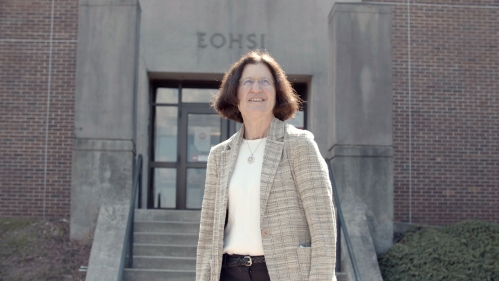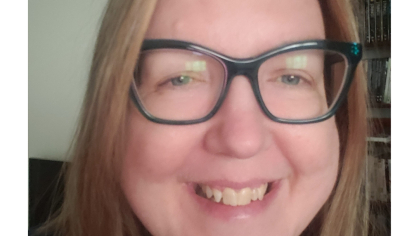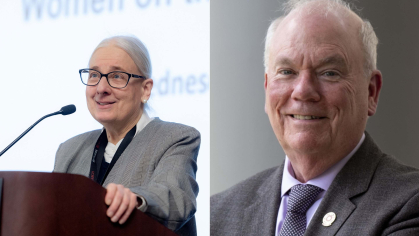U.S. Law Enforcement Officers Honor Director of Rutgers World Trade Center Health Program

Michael Vaiani, a survivor of the terrorist attacks on the World Trade Center on Sept. 11, 2001, is grateful for the compassion and care he received from Iris Udasin, a medical doctor and Rutgers professor.
“It’s easy to say somebody cares, but Dr. Iris Udasin has a passion for people’s well-being. You can’t fake that,” the Wall Township, N.J., resident said. “She called me at 9:30 at night to tell me the CT scan is fine. Who does that?”
Vaiani was a member of the Secret Service working at Building 7 at the World Trade Center on 9/11. He is representative of the thousands of 9/11 first responders who have been under the care of Udasin, the medical director of the World Trade Center Health Program at Rutgers’ Environmental Occupational Health Sciences Institute’s Clinical Center since its inception in 2003.
Vaiani, now retired from the service, was injured while assisting people trapped in the rubble near the Winter Garden Atrium and has been stoically dealing with multiple health issues ever since. When he became a patient at Rutgers World Trade Center clinic in 2008, he said the compassion he received under Udasin’s care made him feel like he was home.
“She’s a really special person,” said Vaiani who has been Udasin’s patient for 16 years.
On Sept. 11, 2024, Udasin will receive the Federal Law Enforcement Officers Foundation’s “Service Above Self” award on behalf of law enforcement officers nationwide, presented at the National Law Enforcement Museum in Washington, D.C.
“Dr. Udasin has been selected for this prestigious award in recognition of her tireless efforts in support of first responders,” said Jon Adler, president of the Federal Law Enforcement Officers Foundation. The program she oversees provided 5,197 members with an exam and treats over 2,100 members annually.
The World Trade Center Health Program at Rutgers is one of six nationally that serve 9/11 first responders and survivors in New York and New Jersey in addition to a national program for those now living outside the metropolitan area. The Rutgers program treats patients for ailments ranging from respiratory, neuromuscular and gastrointestinal disorders to cancers and post-traumatic stress disorder, depression and anxiety disorder as well as rare diseases associated with the toxins.
In 2023, Udasin, along with Judith Graber, an associate professor at the Rutgers School of Public Health, secured federal medical coverage and financial compensation for women exposed at Ground Zero who develop uterine cancer.
“I am grateful that I have had the opportunity to take care of the people who were brave and went into the disaster site,” said Udasin, who also is a professor at Rutgers School of Public Health. “Law enforcement people continue to work dangerous jobs in order to make the world safe for all of us. I feel privileged to be able to provide physical and mental health services to the law enforcement community.”
Known for her patient relations, Udasin is well-loved by the community of first responders that she serves. Although she sees more than 2,000 patients annually, she gets to know her patients and their families and assures they receive the best treatment possible.
“Our work is far from done,” Udasin said. “Solid cancers, which occur on internal organs, may occur 20 to 25 years after exposure – so many of the cancers that we are concerned with are just being diagnosed now. And many patients seek mental health care after retirement.”
Udasin also oversees a team of 50 doctors, nurses, case managers, mental health professionals and administrative staff who examine those sickened by the toxic fumes. There is no cost to the patient for the medical monitoring and treatment.


